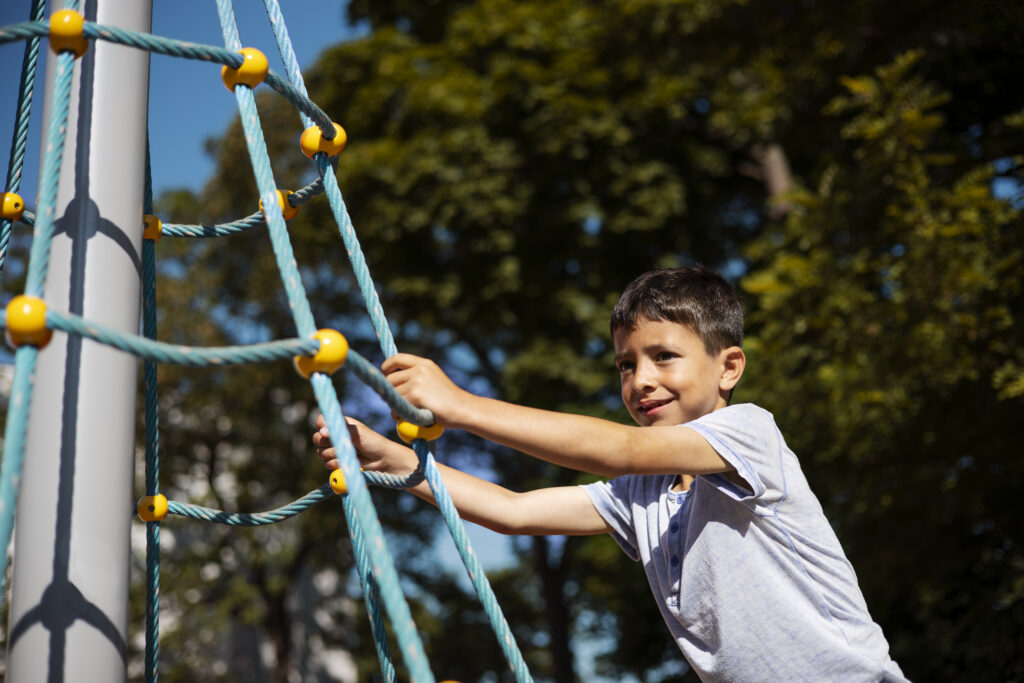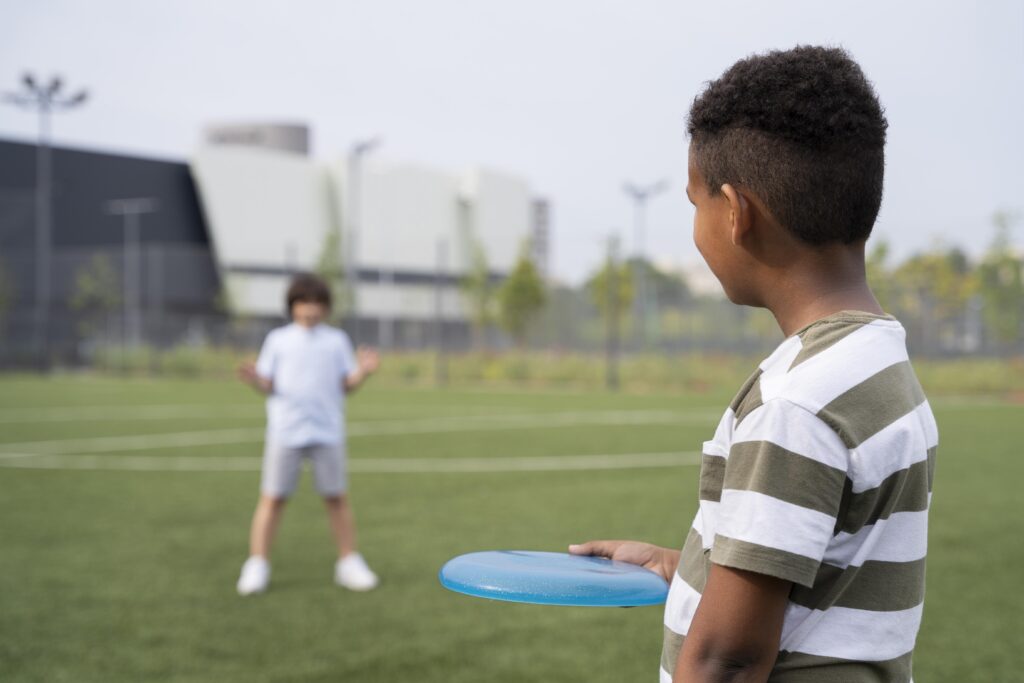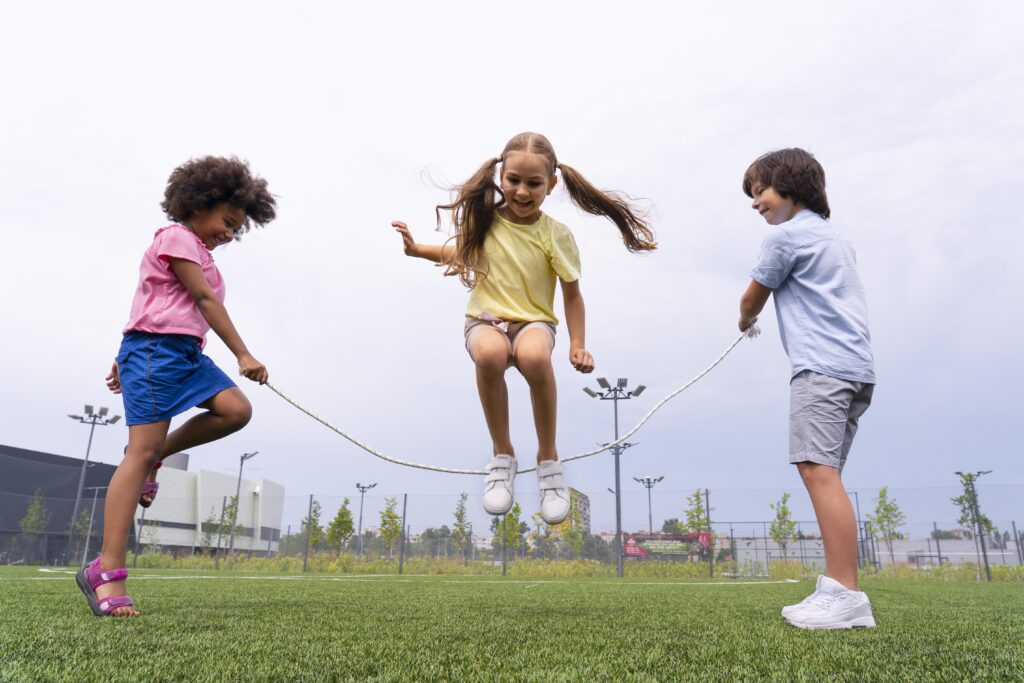In this fast-paced and technology-driven world, children often find themselves lost in indoor online activities, disconnected from the wonders of nature. However, it is crucial to recognize the immense benefits of outdoor activities for students. By engaging in outdoor activities, children promote a healthy lifestyle and enhance their brain development, social skills, and overall happiness. In this blog, we will delve into the significance of outdoor play for kids and explore its numerous advantages to their lives.
Give your child the freedom to grow and learn through outdoor play. Enroll them at Nalanda International School.
The Transformative Effects of Outdoor Games
Nowadays, children often ask, “Why should we play outdoor games?” The answer is that outdoor play can remarkably transform children’s lives in multiple ways. Beyond mere entertainment, these activities offer many benefits that contribute to their overall growth and development.
1. Physical Fitness and Motor Skills Development
Outdoor games provide an ideal platform for children to engage in physical activity and exercise like running, jumping, climbing, and playing sports to help children develop gross motor skills, balance, coordination, and agility. These activities promote cardiovascular health, strengthen muscles and bones, and improve overall fitness. Regular participation in outdoor games encouraged in the top schools in Vadodara lays the foundation for a healthy lifestyle, reducing the risk of obesity and associated health issues.
2. Exposure to Natural Elements
Spending time outdoors exposes children to natural elements like sunlight, fresh air, and natural surroundings. Sunlight is a crucial source of vitamin D, essential for bone health and supporting your immune system. Fresh air helps improve respiratory function and enhances oxygen intake, promoting overall well-being. Furthermore, being in nature creates a sense of calmness and relaxation, reducing stress levels and fostering a positive mindset.
3. Sensory Stimulation
Outdoor environments provide a rich sensory experience for children. The sights, sounds, textures, and natural scents stimulate their senses, encouraging exploration and curiosity. Whether it’s feeling the coolness of grass beneath their feet, hearing the chirping of birds, or smelling the fragrance of flowers, these sensory experiences enhance cognitive development and promote sensory integration.
4. Enhancing Risk Management Skills
Outdoor play allows children to encounter and manage risks in the controlled environment of their schools in Baroda. Climbing trees, balancing on uneven surfaces, or navigating obstacle courses challenge their abilities and judgment. Through these experiences, children learn to assess risks, make decisions, and develop resilience, which helps build confidence and self-esteem as they discover their capabilities and learn to overcome obstacles.
5. Improving Concentration and Attention
Outdoor games require focus, concentration, and sustained attention. Whether following rules in team sports or maintaining awareness in fast-paced activities, children enhance their ability to concentrate and stay engaged. This transferable skill is invaluable in academic settings, as improved attention and concentration positively impact learning outcomes and academic performance.
6. Enhancing Creativity and Imagination
Nature serves as a limitless canvas for children’s imagination and creativity. Outdoor environments offer unstructured play opportunities where children can invent their games, create imaginary worlds, and engage in open-ended play. This freedom to explore and create fosters imagination, problem-solving skills, and divergent thinking.
7. Promoting Healthy Social Interaction
Outdoor games often involve group play, which encourages social interaction, cooperation, and communication. Team sports teach children the importance of collaboration, teamwork, and respecting others’ abilities. Group activities also promote social skills such as sharing, turn-taking, and conflict resolution. These interactions nurture positive relationships, empathy, and the ability to work effectively with others.
Don’t miss out on the benefits of outdoor play for your child’s development. Choose Nalanda International School now!
Nature’s Playground: Stimulating Brain Development
Outdoor play and brain development are completely intertwined. The natural world provides a stimulating environment for children that engages their senses, fosters curiosity, and nurtures cognitive growth. Let’s explore how outdoor play in nature contributes to the development of young minds.
1. Sensory Stimulation and Cognitive Skills
The diverse sights, sounds, textures, and smells in nature provide children with rich sensory experiences. Whether it’s feeling the softness of moss, hearing the rustling of leaves, or observing the vibrant colors of flowers, these sensory encounters engage multiple brain areas. Such stimulation enhances sensory integration, perception, and cognitive skills. Children learn to distinguish between various stimuli, process that information, and connect their senses with the world around them.
2. Problem-Solving and Critical Thinking
Nature offers children numerous opportunities for problem-solving and critical thinking. Outdoor play often involves encountering challenges and obstacles that require creative solutions. Whether it’s figuring out how to climb a tree, navigate a trail, or build a makeshift bridge, children engage in hands-on problem-solving experiences. These experiences develop their ability to analyze situations, think critically, and apply logical reasoning to overcome obstacles.
3. Imagination and Creativity
The open-ended nature of outdoor play allows children’s imaginations to soar. Nature’s playground becomes the canvas for imaginative play, storytelling, and role-playing. Children can transform sticks into wands, fallen logs into pirate ships, or a patch of grass into a magical kingdom. Engaging in imaginative play nurtures creativity, encourages abstract thinking, and enhances storytelling abilities. This form of play stimulates the brain’s creative centers, fostering innovative thinking and originality.
4. Nature as a Learning Environment
Nature presents a myriad of educational experiences. Outdoor play becomes an interactive classroom where children can observe and learn about plants, animals, ecosystems, and the environment. Exploring nature helps develop scientific inquiry skills as children ask questions, make observations, and seek explanations. They develop a deeper understanding of the natural order by learning about habitats, life cycles, and ecological interconnections.
5. Emotional Regulation and Well-Being
Spending time in nature positively impacts children’s emotional well-being and regulation. Nature’s calming and soothing effects reduce stress, anxiety, and emotional fatigue. Outdoor play provides a space for children to unwind, recharge, and develop emotional resilience. The serene and peaceful environment facilitates a sense of tranquility, enhancing overall mental well-being and positive mood.
6. Enhanced Concentration and Focus
Engaging with nature requires sustained attention and focus. Whether observing wildlife, identifying plants, or following a trail, children learn to concentrate on the task. This practice of focused attention transfers to other areas of their lives, including academic pursuits. Improved concentration and focus contribute to better learning outcomes and increased academic success.
7. Mind-Body Connection
Outdoor play promotes a strong mind-body connection. Physical activity in a natural setting helps release endorphins to enhance mood and promote mental well-being. This connection between physical movement and mental stimulation supports children’s overall cognitive development, memory retention, and learning capacity.
Take the first step towards a well-rounded education. Enroll your child at Nalanda International School and let them explore through outdoor play.
Social Skills and Emotional Well-Being through Outdoor Play

Outdoor play offers physical and cognitive benefits and plays a crucial role in developing children’s social skills and emotional well-being. The natural environment provides a unique setting for children to interact, communicate, and navigate various social situations. Let’s explore why it is important for children to play outdoor games to nurture social skills and promote emotional well-being.
1. Cooperative Play and Teamwork
Outdoor play often involves group activities, such as team sports, group games, or collaborative projects. These experiences require children to work together, cooperate, and communicate effectively. Whether strategizing during a game of soccer, building a fort together, or organizing a treasure hunt, children learn the value of teamwork, negotiation, and compromise. They understand shared goals, cooperation, and the importance of contributing to the group’s success.
2. Communication and Language Development
Outdoor play provides a natural setting for children to practice and refine their communication skills. In group play, they learn to express their thoughts, ideas and needs effectively. They practice active listening, taking turns, and conveying messages to their peers. Outdoor play also exposes children to new vocabulary related to nature, environmental elements, and outdoor activities, fostering language development and expanding their communication abilities.
3. Conflict Resolution and Emotional Regulation
In outdoor play, children may encounter conflicts, disagreements, or challenges that require resolution. These situations provide opportunities for children to develop conflict resolution skills, negotiation strategies, and emotional regulation. They learn to express their emotions appropriately, understand others’ perspectives, and find peaceful resolutions. Outdoor play encourages empathy, understanding, and the ability to navigate complex social dynamics.
4. Empathy and Perspective-Taking
Engaging with nature and participating in outdoor activities nurtures empathy and perspective-taking in children. It helps them understand the interconnectedness of living things, develop an appreciation for nature, and learn to care for their environment. Outdoor play promotes empathy towards animals, plants, and their peers, fostering a sense of responsibility and compassion. By experiencing the natural world, children develop a broader perspective and understanding of their place.
5. Self-Confidence and Self-Esteem
Playing outdoor games provides opportunities for children to take risks, try new activities, and discover their capabilities. Mastering physical challenges, overcoming obstacles, and achieving personal goals in outdoor settings enhance children’s self-confidence and self-esteem. As they engage in outdoor activities, they develop competency, resilience, and a positive self-image, positively impacting their emotional well-being.
6. Connection with Nature and Emotional Well-Being
Spending time in nature has been linked to better emotional well-being in children. Outdoor play in natural environments fosters a sense of connection and belonging to the natural world. Being in nature reduces stress, improves mood, and promotes overall mental health. Children can find comfort, peace, and a sense of wonder in the great outdoors, contributing to their emotional well-being.
7. Friendship Building and Social Bonding
Outdoor play provides ample opportunities for children to make new friends, build relationships, and strengthen social bonds. Engaging in outdoor activities as a group creates shared experiences, common interests, and a sense of camaraderie. Children learn to cooperate, collaborate, and forge friendships through shared adventures, fostering social connections and a sense of belonging.
Experience the difference outdoor play can make in your child’s life. Enroll at Nalanda International School now!
Academic Enhancement through Outdoor Activities

Outdoor activities benefit children’s physical and social development and positively impact their academic performance and overall learning experience. Let’s explore the benefits of outdoor activities for students contributing to academic enhancement.
1. Improved Attention and Concentration
Engaging in outdoor activities allows children to take a break from the structured indoor learning environment. Spending time in nature and outdoor play reduces mental fatigue, improves focus, and enhances attention span. Research has shown that exposure to natural environments enhances cognitive performance, attention restoration, and concentration. By providing a refreshing change of scenery, outdoor activities help students recharge their minds, leading to improved academic engagement and performance.
2. Hands-on Learning and Experiential Education
Outdoor activities offer hands-on learning experiences that complement classroom instruction. Exploring nature, conducting field experiments, and observing natural phenomena provide real-world contexts for learning. Whether studying ecosystems, observing plant and animal life, or conducting science experiments outdoors, these experiential learning opportunities deepen students’ understanding and facilitate a more profound connection with academic concepts. Outdoor activities encourage curiosity, critical thinking, and a sense of wonder, fostering a love for learning.
3. Multidisciplinary Learning
Outdoor activities often integrate multiple academic subjects, promoting interdisciplinary learning. For example, a nature hike can incorporate elements of biology, geography, environmental science, and even art. Outdoor play and exploration allow students to apply knowledge from various disciplines practically and meaningfully. This multidisciplinary approach encourages students to connect with different subjects, enhancing their overall understanding and promoting a holistic learning experience.
4. Enhanced Creativity and Problem-Solving Skills
Outdoor activities stimulate creativity and problem-solving skills. Nature’s diverse and unpredictable elements present unique challenges that require innovative thinking and creative solutions. Students engage in critical thinking, adaptability, and problem-solving, whether building a shelter, navigating a trail, or designing a natural artwork. These experiences promote creativity, resourcefulness, and the ability to think outside the box, all essential skills for academic success.
5. Environmental Awareness and Sustainability Education
Outdoor activities provide opportunities to develop environmental awareness and foster a sense of responsibility towards the natural world. Engaging with nature promotes a deeper understanding of ecosystems, biodiversity, and environmental challenges. Through outdoor play, students learn about the importance of environmental conservation and sustainability. This knowledge equips them with the tools to become environmentally conscious citizens, advocating for positive change and contributing to a sustainable future.
6. Enhanced Physical Education and Health
Engaging in outdoor play contributes to physical fitness, positively impacting academic performance. Regular physical activity improves cardiovascular health, boosts energy levels, and enhances cognitive function. Students participating in outdoor play and sports develop physical skills, coordination, and overall fitness. Research has shown a proven correlation between physical fitness and academic achievement, highlighting why it is important for children to play outdoor games as part of a well-rounded education.
7. Inspiration and Motivation
Outdoor activities provide inspiration and motivation for learning. The natural wonders, the beautiful outdoors, and the thrill of adventure can spark students’ curiosity and enthusiasm. When students feel inspired and motivated, they are more likely to engage and invest in their academic pursuits. Outdoor activities offer a fresh perspective, igniting a passion for learning and fostering a positive attitude toward education.
Join the Nalanda International School community and unlock the power of outdoor play for your child.
Reconnecting with Nature: The Value of Outdoor Games
Children often find themselves disconnected from nature in today’s rapidly-changing digital world. However, the benefit of outdoor game-playing goes beyond physical exercise and academic enhancement. It is a powerful tool for reconnecting with nature and cultivating a deep environmental appreciation. Let’s explore the importance of outdoor games in reconnecting children with nature.
1. Nature as a Playground
Outdoor games provide an opportunity for children to experience nature firsthand. Whether running barefoot on grass, climbing trees, or splashing in puddles, such actions immerse children in the natural world. Outdoor games create a sense of joy and wonder, allowing children to interact with the elements and engage their senses. By experiencing the beauty and abundance of nature through play, children develop a profound connection and appreciation for the natural environment.
2. Environmental Awareness
Engaging in outdoor games facilitates environmental awareness and a sense of responsibility towards nature. When children spend time outdoors, they feel the impact of human activities on the environment. They witness the beauty of ecosystems, wildlife diversity, and the fragile balance in nature. This firsthand experience fosters a sense of stewardship, encouraging children to take actions that promote conservation and sustainability.
3. Conservation and Sustainable Practices
Playing outdoor games offers an opportunity to teach children about conservation and sustainable practices. Children learn about reducing waste, conserving resources, and protecting habitats through nature-based play. They understand the significance of conserving natural resources for future generations. Outdoor games can be designed to incorporate lessons on recycling, energy conservation, and other eco-friendly practices, empowering children to become environmentally responsible individuals.
4. Emotional Connection and Well-Being
Spending time in nature positively impacts children’s emotional well-being. Outdoor activities offer an escape from daily life pressures, offering a space for relaxation, reflection, and rejuvenation. The sights, sounds, and smells of nature have a calming effect, which helps reduce stress and anxiety. Outdoor play allows children to experience a sense of freedom and a deeper connection with their surroundings, promoting a positive mood and overall emotional well-being.
5. Curiosity and Exploration
Outdoor games encourage curiosity and a sense of exploration. Mother nature is full of mysteries waiting to be uncovered. Whether investigating insects, examining different types of rocks, or identifying bird species, outdoor play stimulates children’s natural curiosity. Through exploration, children develop a deeper sense of the natural order, fostering a lifelong love for learning and a sense of wonder.
6. Health Benefits
Engaging in outdoor games not only reconnects children with nature but also offers numerous health benefits. Spending time outdoors exposes children to fresh air, sunlight, and natural surroundings, promoting physical fitness, strengthening the immune system, and supporting overall well-being. Outdoor play helps reduce sedentary behavior and screen time, combating the growing concern of childhood obesity and related health issues.
7. Lifelong Appreciation for Nature
Integrating outdoor games into children’s lives instills a lifelong appreciation for nature. When children develop positive connections with the great outdoors, they are more likely to seek out nature as they grow older. This appreciation for nature can lead to a constant connection with the environment, participation in outdoor activities, and even careers in fields related to conservation and environmental sciences.
Give your child the gift of outdoor play. Choose Nalanda International School for holistic development.
Exploring the World of Outdoor Games

![]() Outdoor games offer a diverse and exciting world of play for children. From traditional games to innovative activities, the possibilities for outdoor fun are endless. Let’s explore some important information on outdoor games and discover the joy and adventure they provide.
Outdoor games offer a diverse and exciting world of play for children. From traditional games to innovative activities, the possibilities for outdoor fun are endless. Let’s explore some important information on outdoor games and discover the joy and adventure they provide.
1. Traditional Outdoor Games
Traditional outdoor games have been passed down through generations and continue to fascinate children’s imaginations. Games like tag, hide-and-seek, and capture the Flag encourage physical activity, strategic thinking, and social interaction. These timeless games teach children important skills such as teamwork, communication, and sportsmanship. They also foster a sense of nostalgia, connecting children to their cultural heritage and the play experiences of previous generations.
2. Nature-Based Scavenger Hunts
Scavenger hunts provide a thrilling and educational outdoor adventure for children. By creating lists of items or clues related to the natural environment, children embark on a quest to find hidden treasures. Whether searching for specific leaves, identifying animal tracks, or collecting natural objects, nature-based scavenger hunts encourage observation skills, critical thinking, and a deeper connection with the natural world.
3. Outdoor Sports and Team Games
Outdoor sports and team games allow children to engage in friendly competition while developing physical fitness and teamwork. Soccer, basketball, cricket, and other team sports promote physical health and teach important values such as cooperation, communication, and perseverance. These activities boost leadership skills, self-confidence, and a sense of camaraderie among teammates.
4. Creative Nature Art
Outdoor play can also inspire artistic expression. Encouraging children to create art using natural materials found in their surroundings stimulates creativity and a deeper appreciation for the beauty of nature. Activities such as making leaf rubbings, creating mandalas with flowers and rocks, or constructing sculptures from sticks and leaves allow children to engage with nature uniquely and artistically. These creative efforts provide a sense of accomplishment and encourage children to see the world around them as a canvas for their imagination.
5. Water Play
Water play is a refreshing and exciting outdoor activity, especially during warm weather. Whether splashing in a pool, running through sprinklers, or playing with water balloons, water play offers sensory stimulation, physical exercise, and endless entertainment. Water play also introduces children to conservation, teaching them to appreciate and conserve this valuable resource.
6. Adventure and Nature Exploration
Outdoor games can serve as gateways to thrilling adventures and nature exploration. Activities such as hiking and camping expose children to the wonders of the natural world, allowing them to develop resilience, problem-solving skills, and a deeper understanding of their environment. Adventure-based outdoor games instill a sense of adventure and curiosity, encouraging children to explore and discover the beauty of the great outdoors.
7. DIY Outdoor Games
You can unleash creativity by designing and building your outdoor games. From obstacle courses and homemade mini-golf to DIY treasure hunts and homemade carnival games, the possibilities are limited only by imagination. Involving children in designing and constructing these games nurtures problem-solving skills, critical thinking, and teamwork. DIY outdoor games offer a unique and personalized play experience tailored to the specific interests and abilities of the children involved.
Enroll your child at Nalanda International School and let them experience the joy of outdoor play!
Conclusion
In this digital age, where everything is online, even games, you’ll often hear children asking, “Why should we play outdoor games when we can enjoy indoors on a screen?” Outdoor play holds immense significance in nurturing children’s growth and development. Children experience physical fitness, cognitive stimulation, social interaction, emotional well-being, and academic enhancement through outdoor activities. As parents and educators, we are responsible for giving children ample opportunities to engage in outdoor play, fostering their overall well-being, and instilling a lifelong connection with nature. Let us prioritize outdoor play and unlock its transformative power in shaping our children’s bright and holistic future.
Discover the perfect balance between learning and outdoor play at Nalanda International School. Enroll your child today!


